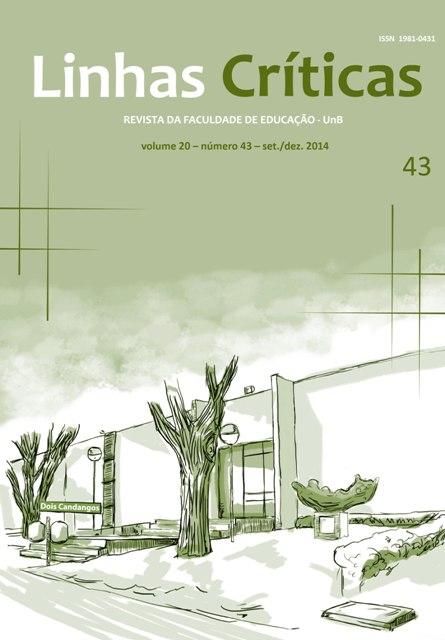Reflections about neutrality in curricula and the need for democratic partiality
DOI:
https://doi.org/10.26512/lc.v20i43.4359Keywords:
Curriculum, Speech, Hegemony, JusticeAbstract
As societies become increasingly complex, trying to understand them without multiple perspectives becomes social and epistemologically irresponsible. One must know what intervenes in a discourse, when it created, such as the ideology and emotions of the writer. The intention here is to think about how these social marks are, and how they are filtered in the types of curricula created. The hegemonic way of understanding the world can be present in different contexts, strengthening the advent certain social groups and realities and silencing or weakening others. The result of this would be public curricular material that does not apprehend the cultural reality it must reflect.
Downloads
References
APPLE, Michael. Ideología y Currículum. Madrid: Akal, 1986.BAKHTIN, Mikhail. Teoría y estética de la novela. Madrid: Taurus, 1989.
APPLE, Michael. Problemas de la poética de Dostoyevsky. México D.F.: FCE, 2003.
BHABHA, Homi. O local da cultura. Bello Horizonte: UFMG, 2001.
BHABHA, Homi. O bazar global e o clube dos cavalheiros ingleses: o entrelugar das culturas. Río de Janeiro: Editora Rocco, 2011.
CARBONELL, José L. La atención a la diversidad y la mejora de la convivenciamulti/intercultural”. In: PAREDES, Joaquín y otros (Comps.). La práctica de la innovación educativa. Madrid: Síntesis, 2009. p. 49-57.
CERTEAU, Michel de. História e psicanálise: entre ciência e ficção. Bello Horizonte: Auténtica Editora, 2011.
DEBORD, Guy. La sociedad del espectáculo. Valencia: Pre-Textos, 2005.
FRASER, Nancy. Escalas de justicia. Barcelona: Herder, 2008.
FUKUYAMA, Francis. El fi n de la historia y el último hombre. Barcelona: Planeta, 1992.
IYANGA PENDI, Augusto. Política de la educación y la globalización neoliberal. Valencia: Universitat de Valencia, 2004.
LAVAL, Christian. La escuela no es una empresa. Barcelona: Paidós, 2004.
NUSSBAUM, Martha. Las fronteras de la justicia. Barcelona: Paidós, 2006.
RIÁDIGOS MOSQUERA, Carlos. Instrumentos para a análise da xustiza social nos sistemas educativos: aplicación a materiais curriculares do sistema educativo de Galicia. 2014. 620 p. Tese (Doutorado em Educação). Programa de pós-graduação em Investigação e inovação educativa, Universidade de A Coruña ”“ UDC, Galicia, Espanha. 2014.
SANTOS, Boaventura de Sousa. Para além do Pensamento Abissal: Das linhas globais a uma ecologia de saberes. In: SANTOS, Boaventura de Sousa; MENESES, Maria Paula. Epistemologias do Sul. 2ª ed. São Paulo: Cortez, 2007. p. 31-83.
TORRES SANTOMÉ, Jurjo. La justicia curricular: el caballo de Troya de la cultura escolar. Madrid: Morata, 2011.
VAN DIJK, Teun. Ideología: una aproximación multidisciplinaria. Barcelona: Gedisa, 1999.
VOLOSHINOV, Valentin. Discurso na vida e discurso na arte. New York Academic Press, 1976.
YOUNG, Iris Marion. La justicia y la política de la diferencia. Madrid: Cátedra, 2000.
Downloads
Published
How to Cite
Issue
Section
License
Copyright (c) 2016 Linhas Críticas

This work is licensed under a Creative Commons Attribution 4.0 International License.
Authors who publish in this journal agree to the following terms:
-Authors maintains the copyright and grants the journal the right of first publication, the work being simultaneously licensed under the Creative Commons Attribution License which allows the sharing of the work with recognition of the authorship of the work and initial publication in this journal.
- Authors are authorized to enter into additional contracts separately, for non-exclusive distribution of the version of the work published in this journal (eg publish in institutional repository or as a book chapter), with acknowledgment of authorship and initial publication in this journal.
-Authorers are allowed and encouraged to publish and distribute their work online (eg in institutional repositories or on their personal page) at any point before or during the editorial process, as this can generate productive changes as well as increase the impact and the citation of published work (See The Effect of Free Access).



